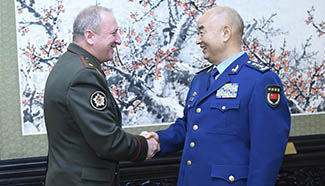PHNOM PENH, Oct. 12 (Xinhua) -- Chinese President Xi Jinping published a signed article in the leading Cambodian newspaper Rasmei Kampuchea under the title "China and Cambodia: Good Neighbors and Trusted Friends" here on Wednesday, ahead of his state visit to the Southeast Asian country.
The English translated version of the article is as follows.
China and Cambodia: Good Neighbors and Trusted Friends
By H.E. Xi Jinping, President of the People's Republic of China
At the invitation of King Norodom Sihamoni, I will pay a state visit to the Kingdom of Cambodia. This will be my first visit to Cambodia as the President of China, a visit I look forward to with great anticipation.
Cambodia, an important link on the ancient Maritime Silk Road, is renowned for its rich history and the unique Khmer culture. Angkor Wat, with its magnificent architecture and stunning bas-reliefs, stands as a true tribute to the talent of the Cambodian people and shines in the annals of human civilization. Entering the 21st century, Cambodia has made much progress in its development and delivered a better life to its people. It is heading towards a promising future.
China and Cambodia are geographically and culturally close to each other, and our friendly exchanges trace back more than a millennium. Through the ancient Maritime Silk Road, Chinese porcelain and lacquer wares were brought to Cambodia, and Cambodian spices and yellow wax stones were sent to China. The bas-reliefs of the Bayon Temple vividly depict the scenes of Chinese merchants trading with the locals in Cambodia. During China's Southern and Northern Dynasties in the fifth and sixth centuries AD, Sanghapala, Mandrasena and Subhuti, three eminent Cambodian monks, came to China to disseminate Buddhism. In China's Yuan Dynasty, Zhou Daguan, a Chinese envoy, visited Cambodia. He later wrote The Customs of Cambodia, providing a vivid account of the local customs in Angkor and the friendly interactions between Chinese and Cambodians. Zheng He, the famous navigator from China's Ming Dynasty, made many stopovers in Cambodia on his voyages. He described Cambodia as a land with a warm climate and fertile fields where the locals boiled seawater to make salt and had colorful customs. The Sam Po Kong Temple in the suburb of Kampong Cham that honors Zheng He still has many visitors today, a testament to the time-honored friendship between Chinese and Cambodians.8
A Cambodian proverb likens trust to the growth of a tree. The traditional China-Cambodia friendship, tested by the times and a changing international landscape, has grown strong like a luxuriant tree thanks to efforts made by past leaders of both countries. In 1958, China and Cambodia established diplomatic ties, opening a new chapter in their bilateral relations. Over the past 58 years, successive leaders of both countries have maintained close interactions and developed a close bond of friendship. King Father Norodom Sihanouk once fondly said that the China-Cambodia friendship is like a flower that never withers and will always blossom under the bright sky.
Entering the new era, the China-Cambodia friendship has continued to flourish, beaming with new vitality. Our two countries enjoy deep political trust and win-win economic cooperation. We have carried out fruitful cooperation in various areas, and maintained close consultation and coordination on international and regional affairs, setting an example of how two countries should treat each other as equals and cooperate with absolute sincerity.
In 2010, China and Cambodia established a comprehensive strategic partnership, ushering their ties into a new era. We share a similar development philosophy, and we agree to find ways for China's "Belt and Road" initiative and Cambodia's "Rectangular Strategy" to work together. Two-way trade and investment have maintained strong growth in recent years. China has been Cambodia's biggest trading partner and source of investment for three years. The year 2015 saw our two-way trade topping 4.4 billion U.S. dollars.
China and Cambodia are devoted friends. On issues concerning each other's core interests and major concerns, our two countries have stood together and supported each other. China firmly supports and has assisted Cambodia in its fight for independence and liberation, as well as maintaining peace and stability. In the 1990s, a Chinese engineering corps of over 800 men took part in peacekeeping missions in Cambodia. In just 18 months, they built and repaired the Phnom Penh International Airport and two other airports, four national-level highways over 640 km in length and over 40 bridges. With blood and sweat, the Chinese peacekeepers helped nurture the China-Cambodia friendship.
We will never forget that Cambodia was among the first group of countries to establish diplomatic ties with New China when it faced a foreign blockade in its early days. Cambodia was firm in supporting China's efforts to restore its lawful seat in the United Nations. When China acted to safeguard its territorial sovereignty and maritime interests and was devoted to resolving related disputes through peaceful negotiation, Cambodia did not hesitate to speak out to uphold justice. When China's Sichuan, Qinghai and Gansu provinces were hit by natural disasters, the Cambodian royal family, government leaders and public shared our grief and extended a helping hand to us. We have a Chinese saying -- "Hardship reveals true friendship." Similarly, a Cambodian saying goes "Only in tough time can one tell a true friend from a false one." Our two peoples value our ties and treat each other as true friends; the China-Cambodia friendship has developed deep roots in the hearts of both peoples.
China and Cambodia are neighbors who share a bond of brotherhood. The two countries have supported each other in improving the livelihoods of their respective people. China built Cambodia's first four-lane national highway as an assistance project and was contracted to build Cambodia's first cement plant, first coal-fired power station and its largest hydropower station. The booming Sihanoukville Special Economic Zone stands as testimony to how fruitful China-Cambodia cooperation can be. By June 2016, 100 companies were operating in the zone with a total investment of 280 million U.S. dollars, creating over 13,000 jobs. By strengthening economic complementarity and unlocking potential, our two countries have expanded and upgraded cooperation in infrastructure, agriculture, water conservancy, energy, resources, information and telecommunications; such cooperation projects are expected to deliver early returns.
China and Cambodia enjoy flourishing people-to-people and cultural exchanges, which have added strong momentum to the growth of their relations. Chinese cultural relics experts have spent years in Cambodia to protect and restore the Chau Say Tevoda Temple and the Ta Keo Temple in Angkor. Chinese doctors have performed free cataract operations for over 1,000 patients across Cambodia. Chinese agro-technicians have passed on agro-technologies to Cambodian villagers during the day and taught them Chinese in the evening, moves that have been warmly received by the locals. The Confucius Institute launched in Cambodia in 2009 now offers classes to over 10,000 students in 14 different locations. By 2015, more than 1,000 Cambodian students were studying in China on scholarship programs sponsored by the Chinese government.
Both China and Cambodia are at crucial stages in their respective development and face the similar tasks of deepening reform, opening further and upgrading their economic structures. Both countries are committed to economic integration and cooperation in our region. Having reached a new stage in its relations with Cambodia, China will work with Cambodia to strengthen their bilateral comprehensive strategic partnership in a wide range of areas so as to deliver greater benefits to the two peoples.
-- We will also deepen political trust. China will maintain high-level visits and enhance communication with Cambodia. I hope that the two countries will step up exchanges between their governments, political parties and legislatures as well as at the sub-national level. China will continue to support Cambodia in pursuing a development path that suits its own national conditions and firmly support Cambodia in safeguarding sovereignty, maintaining domestic stability and accelerating economic development.
-- We will take solid steps to promote win-win cooperation. China will continue to examine how our respective development strategies can complement one another and launch priority projects within the "Belt and Road" initiative to better involve Cambodia. We will, in light of local conditions, deepen cooperation in areas such as agriculture, water conservancy, infrastructure, information and telecommunications. China will take measures to increase imports from Cambodia and scale up two-way trade.
-- We will strengthen coordination with Cambodia on the international stage. China supports Cambodia as an important member of the Association of Southeast Asian Nations and will deepen collaboration with Cambodia in East Asia, the Lancang-Mekong River, the United Nations and other regional and multilateral arenas. The purpose of such collaboration is to uphold the common interests of our two countries and other developing countries and build an Asian community with a shared future. East Asia cooperation has entered a critical stage. We should continue to focus on the general goal of development and promote sound and steady progress in East Asia.
-- We will endeavor to enhance people-to-people friendship. China will work with Cambodia to unleash the full potential of the Confucius Institute and the China Culture Center and enhance cooperation in education, culture, tourism and health. With these efforts, we can deepen mutual understanding and friendship between our two peoples, especially among young people, and ensure that the China-Cambodia friendship will be passed on from generation to generation.
I am convinced that with our concerted efforts, the traditional friendship between China and Cambodia will bear more fruits, allowing us to forever be good neighbors and genuine trusted friends.











